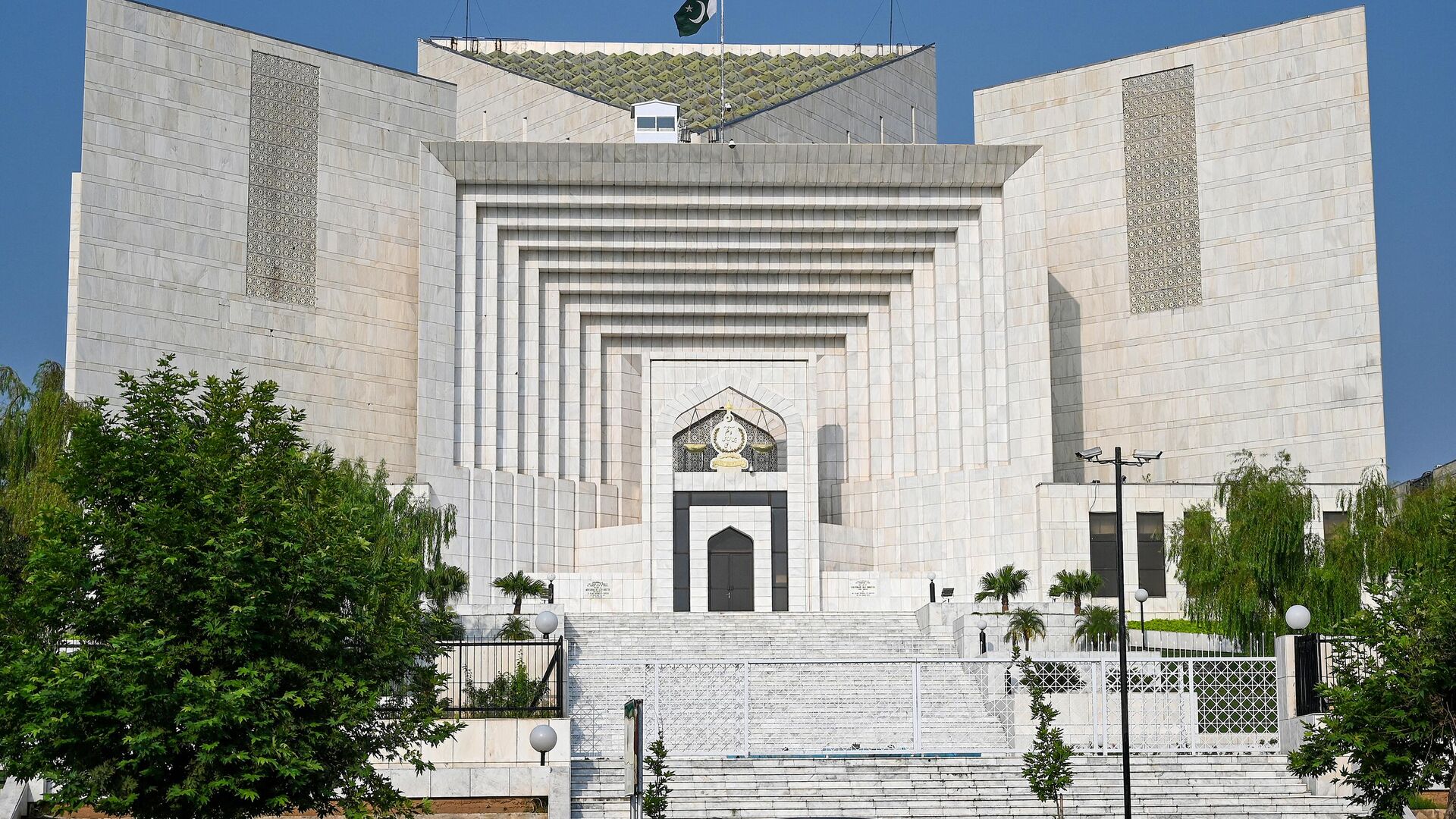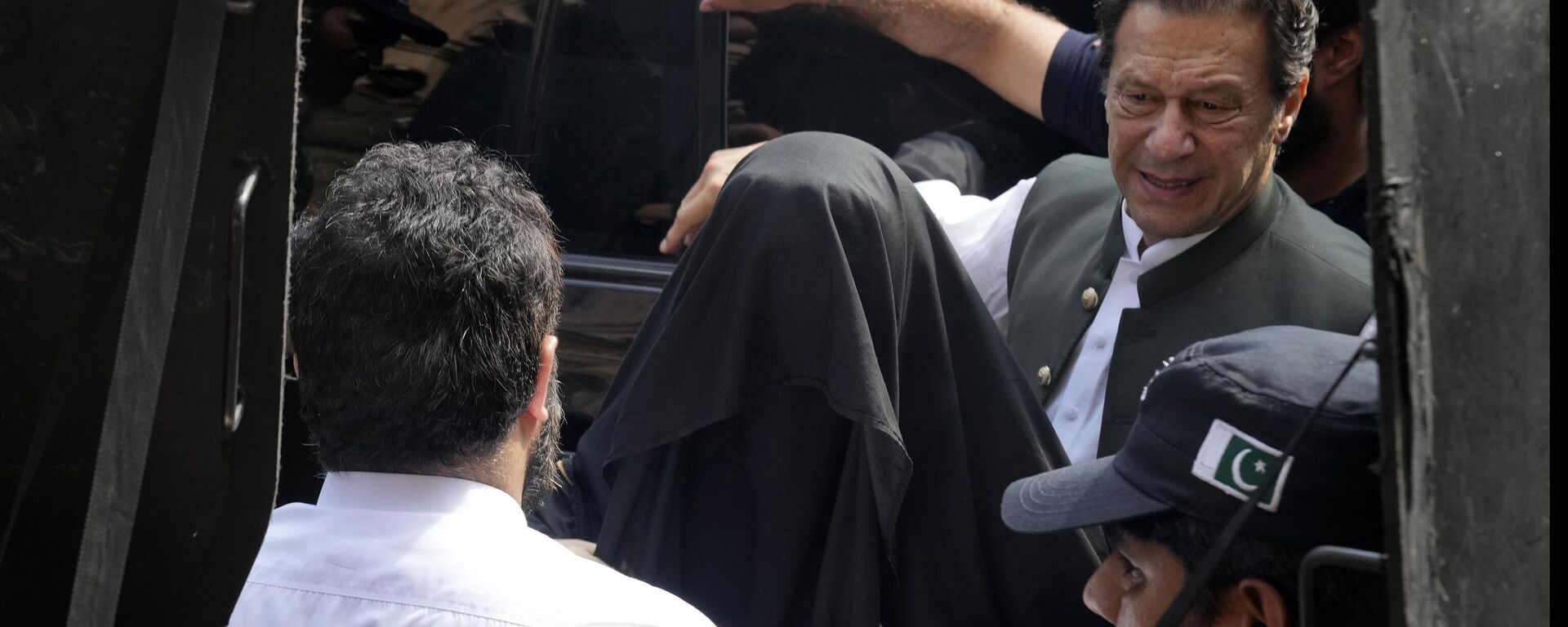https://sputniknews.in/20240628/pakistan-rebukes-us-resolution-demanding-election-integrity-probe-7720227.html
Pakistan Rebukes US Resolution Demanding Election Integrity Probe
Pakistan Rebukes US Resolution Demanding Election Integrity Probe
Sputnik India
The US House of Representatives this week called for a thorough investigation into alleged irregularities in the February 8 general elections in Pakistan... 28.06.2024, Sputnik India
2024-06-28T16:59+0530
2024-06-28T16:59+0530
2024-06-28T17:16+0530
pakistan
us
brics
foreign interference
multilateral diplomacy
south asia
political controversy
election interference
elections
election fraud
https://cdn1.img.sputniknews.in/img/07e7/07/07/2883715_0:160:3072:1888_1920x0_80_0_0_e3685465419205f765212fd1dc6ad353.jpg
A US House of Representatives resolution alleging irregularities in Pakistan’s February 8 general election has provoked a strong reaction from the nation's authorities. Pakistan's Foreign Office labeled the resolution "detrimental" to bilateral relations and "misinformed" about the country's political landscape.The resolution cited reports of voter intimidation, manipulation of results, and suppression of political opposition. The US' move was presented as an effort to support democratic integrity in Pakistan.Hitting back, Pakistan's Defence Minister Khawaja Asif described it as "interference in the internal affairs" of the country.He added that the resolution has "no value" and was political posturing in an election year in the United States.Likewise, Dr. Shahid Rashid, former unit head of Engro Corporation and political observer told Sputnik India that the US could be accused of selectively criticizing elections to exert pressure on specific countries.Implications on the Bilateral RelationsIn the meantime, the resolution and the subsequent diplomatic fallout have several implications for US-Pakistan relations, according to a former diplomat in Pakistan's Foreign Service, Khalid Shikari. He believes it could lead to a cooling of diplomatic ties, affecting cooperation on various fronts, including security, trade, and regional stability.Moreover, the domestic political landscape in Pakistan could also be affected, Rashid noted. The government may use the US resolution to rally nationalist sentiments and portray itself as a defender of national sovereignty against foreign interference, he added. This could strengthen the government's position domestically, but also exacerbate anti-American sentiments among the Pakistani populace, according to the expert.Meanwhile, Shikari believes, Pakistan’s strong objections to the resolution highlight the sensitivity of external criticism and the potential repercussions on bilateral relations."The situation underscores the delicate balance of international diplomacy, where actions perceived as supportive of democratic values can also be seen as strategic maneuvers with significant geopolitical implications," he pointed out.Criticisms of US Foreign PolicyHowever, according to Shikari, there is inconsistency in the US’ stance on elections.This selective criticism raises questions about the motivations behind the US resolution on Pakistan, both Shikhari and Rashid stressed. Is the call for an investigation genuinely rooted in concerns for democratic integrity, or is it a strategic maneuver to exert pressure on Pakistan, the analysts questioned. The timing and nature of such resolutions often lead to speculation about underlying political intentions, they echoed each other.On the other hand, Rashid stressed that Islamabad is establishing strong ties with other countries, which is not on the United States agenda."The timing shows that Pakistan is enhancing its relations with China, Russia, and other members of the BRICS. Moreover, the country may join the group in the near future and that goes against the US interests in Pakistan," he underscored.Historical Context of US-Pakistan RelationsAs explained by Rashid, the relationship between the US and Pakistan has been marked by periods of close cooperation and significant tension.During the Cold War, Pakistan was a key ally in the US strategy to counter Soviet influence in South Asia. The partnership was particularly strong during the Soviet-Afghan War, when the country served as a crucial conduit for American support to mujahideen fighters. However, the post-9/11 era brought new complexities. Pakistan's role as a front-line state in the war on terror led to both cooperation and friction.This backdrop of the fluctuating alliance explains the current diplomatic spat over the election resolution."The US has often positioned itself as a global promoter of democracy and human rights, but its selective approach to criticizing elections can be seen as a tool of political leverage rather than a consistent ethical stance," the observer stated.* under UN sanctions
https://sputniknews.in/20240607/us-reaction-to-imran-khan-cases-confirms-deceitfulness-7541551.html
pakistan
us
south asia
Sputnik India
feedback.hindi@sputniknews.com
+74956456601
MIA „Rossiya Segodnya“
2024
Aneela Rashid
https://cdn1.img.sputniknews.in/img/07e6/0c/0d/74548_0:0:485:484_100x100_80_0_0_821526e967ae85d041e2d30ee34fa1de.jpg
Aneela Rashid
https://cdn1.img.sputniknews.in/img/07e6/0c/0d/74548_0:0:485:484_100x100_80_0_0_821526e967ae85d041e2d30ee34fa1de.jpg
News
en_IN
Sputnik India
feedback.hindi@sputniknews.com
+74956456601
MIA „Rossiya Segodnya“
Sputnik India
feedback.hindi@sputniknews.com
+74956456601
MIA „Rossiya Segodnya“
Aneela Rashid
https://cdn1.img.sputniknews.in/img/07e6/0c/0d/74548_0:0:485:484_100x100_80_0_0_821526e967ae85d041e2d30ee34fa1de.jpg
pakistan, us, brics, foreign interference, multilateral diplomacy, south asia, political controversy, election interference, elections, election fraud
pakistan, us, brics, foreign interference, multilateral diplomacy, south asia, political controversy, election interference, elections, election fraud
Pakistan Rebukes US Resolution Demanding Election Integrity Probe
16:59 28.06.2024 (Updated: 17:16 28.06.2024) The US House of Representatives this week called for a thorough investigation into alleged irregularities in the February 8 general elections in Pakistan, sparking diplomatic friction between the two nations.
A US House of Representatives resolution alleging irregularities in Pakistan’s February 8 general election has provoked a strong reaction from the nation's authorities. Pakistan's Foreign Office labeled the resolution "detrimental" to bilateral relations and "misinformed" about the country's political landscape.
The resolution cited reports of voter intimidation, manipulation of results, and suppression of political opposition. The US' move was presented as an effort to support democratic integrity in
Pakistan.
Hitting back, Pakistan's Defence Minister Khawaja Asif described it as "interference in the internal affairs" of the country.
"They [US] have no right to interfere in our internal affairs or give any sort of verdict on the matter," Asif told a local TV channel.
He added that the resolution has "no value" and was political posturing in an election year in the United States.
Likewise,
Dr. Shahid Rashid, former unit head of Engro Corporation and political observer told
Sputnik India that the
US could be accused of selectively criticizing elections to exert pressure on specific countries.
This reaction of Pakistan's Foreign Office reflects a "broader concern that external scrutiny could undermine the legitimacy of the elected government and destabilize the political environment in the country," the analyst said.
Implications on the Bilateral Relations
In the meantime, the resolution and the subsequent diplomatic fallout have several implications for US-Pakistan relations, according to a former diplomat in Pakistan's Foreign Service, Khalid Shikari. He believes it could lead to a cooling of diplomatic ties, affecting cooperation on various fronts, including security, trade, and regional stability.
"[This move] might push Pakistan to seek closer ties with other global powers, such as China and Russia, as a counterbalance to US influence. This shift could alter the strategic landscape in South Asia, impacting broader geopolitical dynamics," the diplomat said.
Moreover, the domestic political landscape in Pakistan could also be affected, Rashid noted. The government may use the US resolution to rally nationalist sentiments and portray itself as a defender of national sovereignty against foreign interference, he added. This could strengthen the government's position domestically, but also exacerbate anti-American sentiments among the Pakistani populace, according to the expert.
Meanwhile, Shikari believes, Pakistan’s strong objections to the resolution highlight the sensitivity of external criticism and the potential repercussions on bilateral relations.
"The situation underscores the delicate balance of international diplomacy, where actions perceived as supportive of democratic values can also be seen as strategic maneuvers with significant geopolitical implications," he pointed out.
Criticisms of US Foreign Policy
However, according to Shikari, there is inconsistency in the US’ stance on elections.
"The US selectively denounces electoral processes based on its strategic interests rather than a genuine commitment to democratic principles. We recently saw this in the Indian elections and Bangladesh also. Moreover, the US has historically maintained strong relations with authoritarian regimes in the Middle East, where democratic processes are severely compromised," the diplomat stated.
This selective criticism raises questions about the motivations behind the US resolution on Pakistan, both Shikhari and Rashid stressed. Is the call for an investigation genuinely rooted in concerns for democratic integrity, or is it a strategic maneuver to exert pressure on Pakistan, the analysts questioned. The timing and nature of such resolutions often lead to speculation about underlying political intentions, they echoed each other.
On the other hand, Rashid stressed that Islamabad is establishing strong ties with other countries, which is not on the United States agenda.
"The timing shows that Pakistan is enhancing its
relations with
China, Russia, and other members of the
BRICS. Moreover, the country may join the group in the near future and that goes against the US interests in Pakistan," he underscored.
Historical Context of US-Pakistan Relations
As explained by Rashid, the relationship between the US and Pakistan has been marked by periods of close cooperation and significant tension.
During the Cold War, Pakistan was a key ally in the US strategy to counter Soviet influence in South Asia. The partnership was particularly strong during the Soviet-Afghan War, when the country served as a crucial conduit for American support to mujahideen fighters. However, the post-9/11 era brought new complexities. Pakistan's role as a front-line state in the war on terror led to both cooperation and friction.
"While the US provided substantial military and economic aid to Pakistan, it also expressed persistent concerns about Pakistan's commitment to combating terrorism, particularly regarding alleged support for Taliban* elements in Afghanistan. The US consistently interfered in Pakistan's internal matters, and Pakistan paid a high price in this war as thousands of its soldiers and civilians were killed, displaced from their homes, or injured," Rashid emphasized.
This backdrop of the fluctuating alliance explains the current diplomatic spat over the election resolution.
"The US has often positioned itself as a global promoter of democracy and human rights, but its
selective approach to
criticizing elections can be seen as a
tool of political leverage rather than a consistent ethical stance," the observer stated.



